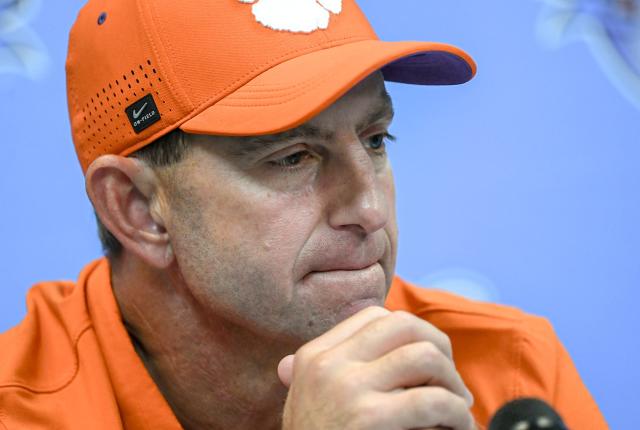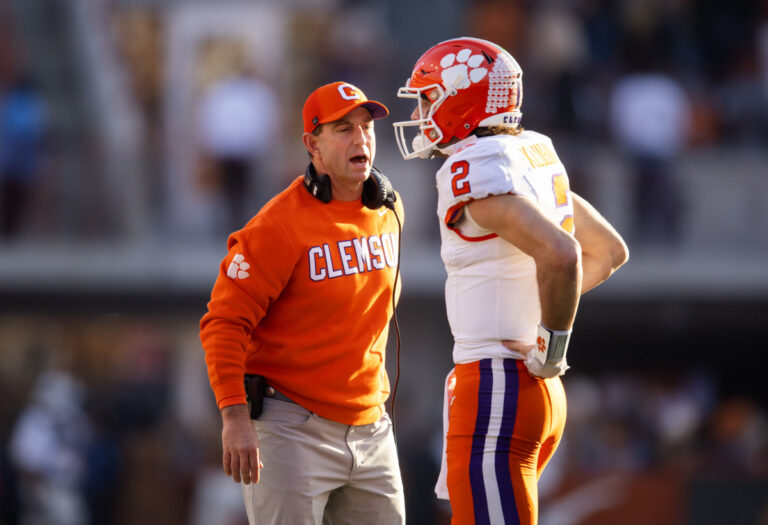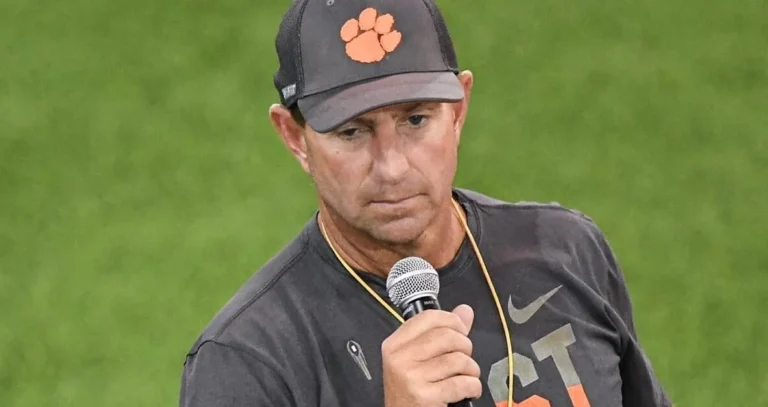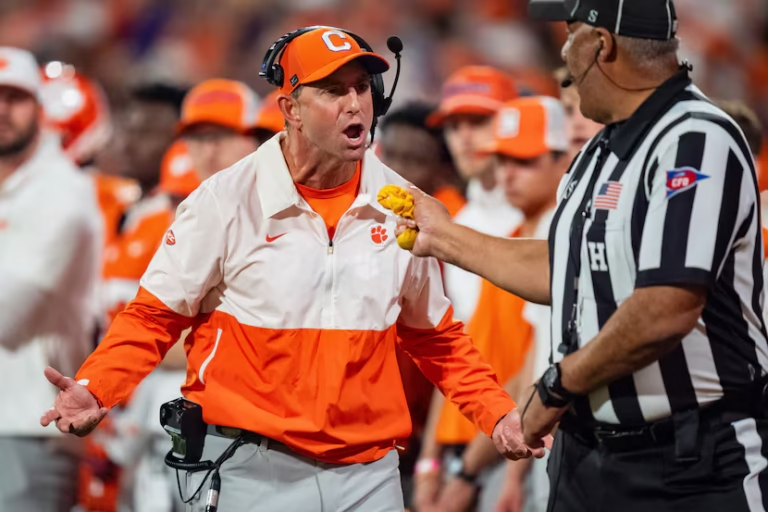
SO SAD: Following the Head Coach Dabo Swinney of the Clemson Tigers Announced His Resignation Because of…
On the morning of December 25, 2024, the college football world was left in shock as Dabo Swinney, one of the most revered coaches in the history of the sport, officially announced his resignation as head coach of the Clemson Tigers. With an illustrious career marked by national championships, ACC titles, and unprecedented success, Swinney’s sudden departure left fans, players, and analysts alike scrambling for answers. The question on everyone’s mind was simple: why now? Why had the architect of Clemson’s modern football dynasty decided to step away from the program he had built into a powerhouse?
To understand the reasons behind Swinney’s resignation, one must consider not only the events leading up to the announcement but also the broader pressures he faced within and outside the football world. Swinney’s tenure at Clemson had been one of sustained excellence, but as with all dynasties, time eventually catches up to even the most celebrated coaches. What transpired in the months leading to his resignation, and why did a man known for his unwavering commitment to the Tigers’ success suddenly choose to walk away?
A Remarkable Legacy
Before diving into the reasons behind Swinney’s resignation, it’s important to appreciate the magnitude of his achievements at Clemson. Swinney became head coach in 2008, taking over a program in need of revitalization. What followed was a transformation that would elevate Clemson into one of the most dominant football programs in the country.
Under Swinney’s leadership, Clemson won two national championships (2016 and 2018) and made multiple playoff appearances. He was known for his ability to recruit top-tier talent, develop his players, and create a culture of family within the program. Swinney also led the Tigers to numerous ACC titles, cementing his status as one of college football’s top coaches.
However, despite these monumental achievements, every coaching career faces a period of adjustment. In the case of Swinney, this adjustment came in the form of evolving expectations, pressure from fans and media, and a changing landscape in college football.
The Pressure of Expectations
As with any elite program, expectations at Clemson had risen to astronomical levels under Swinney. The Tigers’ success in the 2010s meant that a single season without a national championship, or even a conference title, was now seen as a failure by a vocal portion of the fanbase. Swinney, who had once been celebrated for his underdog story, was now expected to maintain the highest level of excellence year after year.
The 2023 season had been particularly challenging for Swinney and the Tigers. Despite having a roster loaded with talent, Clemson suffered unexpected losses, particularly in key games against conference rivals. The team’s offense, once explosive under quarterback Trevor Lawrence and star running back Travis Etienne, had become stagnant, and many wondered whether Swinney had lost his edge.
Media scrutiny intensified, with pundits questioning Swinney’s play-calling, his ability to adapt to new trends in college football, and his reliance on a system that, at times, seemed outdated. Fans began to voice their frustrations, with some even calling for a change at the top. While Swinney’s supporters praised his integrity and leadership, the mounting pressure to win at all costs began to take a toll.
The Rise of NIL and the Transfer Portal
One of the most significant changes to college football in recent years has been the introduction of Name, Image, and Likeness (NIL) rights and the transfer portal. These changes have drastically altered the landscape of recruiting, team-building, and player retention. Coaches who thrived in the old system suddenly found themselves navigating a new, more chaotic environment.
Swinney had been a vocal critic of the NIL system, expressing concerns about its impact on college sports. He had long championed the idea of college athletics being about the student-athletes and their education, rather than focusing on monetary gain. However, as NIL deals became more prevalent, Swinney’s stance seemed increasingly out of touch with the realities of modern college football.
Additionally, the rise of the transfer portal created a level of instability that Swinney, who had built his program on a foundation of long-term player development and loyalty, struggled to adapt to. Top players were leaving Clemson for other programs, while Swinney remained hesitant to fully embrace the portal himself. This reluctance to change his approach in a rapidly evolving game may have contributed to his decision to step down.
Personal Struggles and Burnout
While Swinney’s career had been marked by on-field success, the personal cost of maintaining such a high level of performance is often less visible. The constant pressure to win, recruit, and manage the ever-growing demands of the program had begun to weigh heavily on Swinney’s shoulders.
In the months leading up to his resignation, there were whispers of burnout within the coaching staff and within Swinney himself. The demands of recruiting, the constant media attention, and the emotional toll of managing a top-tier program began to take their toll. Swinney had always prided himself on his positive attitude and energy, but as the losses mounted and the external pressures grew, it became clear that the coach was no longer the same figure who had first taken the Clemson job with such passion and enthusiasm.
Swinney’s decision to resign was likely not just a professional one but also a personal one. Coaching at the highest level requires a significant amount of time away from family, friends, and personal interests. Swinney had been open about the sacrifices he had made over the years, and it’s possible that, after nearly two decades of leading the Tigers, he had come to a point where his personal well-being and family life were more important than the grind of the coaching profession.
The End of an Era
When Dabo Swinney made his announcement, he did so with a heavy heart. He acknowledged the love he had for Clemson, its fans, and its players. He spoke of his deep pride in what he had accomplished during his tenure, from the national championships to the countless young men he had mentored along the way. However, he also spoke about the need for change—both for himself and for the program.
While his resignation was sad, it was also a reminder that no coach, no matter how successful, is immune to the passage of time. Swinney had given everything to Clemson, but it was clear that, at this stage in his life, he needed to step away and allow someone else to take the reins. His decision was ultimately a reflection of his own self-awareness, recognizing that the program needed a fresh voice and a new direction to continue its success.
What’s Next for Clemson?
With Swinney’s resignation, the future of Clemson football was immediately thrown into uncertainty. The athletic department would now face the difficult task of finding a successor who could maintain the high standards set by Swinney while also navigating the changing landscape of college football.
There were several potential candidates on the short list, from current assistants within the Clemson staff to rising stars in college football. Regardless of who takes over, the new head coach would inherit a program with a proud tradition, an excellent recruiting pipeline, and a passionate fanbase eager to see the Tigers return to prominence.
For now, however, Clemson fans would have to come to terms with the fact that an era had ended. The departure of Dabo Swinney marked the end of one of the most successful coaching tenures in college football history. It was a moment of deep sadness for fans and a reminder that even the greatest leaders eventually need to step aside.
Conclusion: A Coach Who Gave It All
Dabo Swinney’s resignation as head coach of the Clemson Tigers was a sad and unexpected turn of events. It marked the end of an era for one of the most successful programs in college football. Swinney’s legacy will undoubtedly live on, from the championships to the impact he had on his players and the Clemson community. However, his departure also serves as a reminder that even the brightest stars in the world of sports eventually burn out.
Whether due to pressure, personal struggles, or a changing landscape, Swinney’s resignation signals the close of a remarkable chapter in college football history. It’s a sad day for Clemson, but it’s also a moment of reflection on what Swinney built and the legacy he leaves behind.





